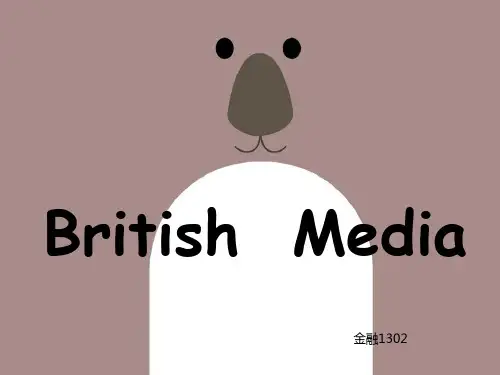英国社会与文化 PPT
- 格式:pptx
- 大小:1.50 MB
- 文档页数:31
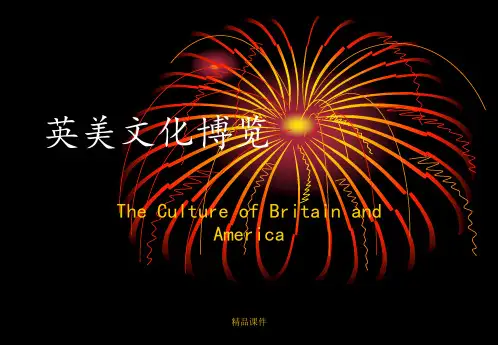


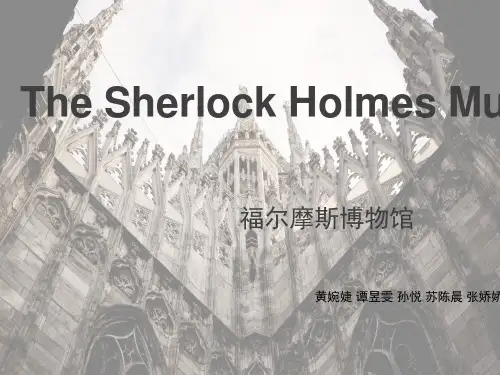
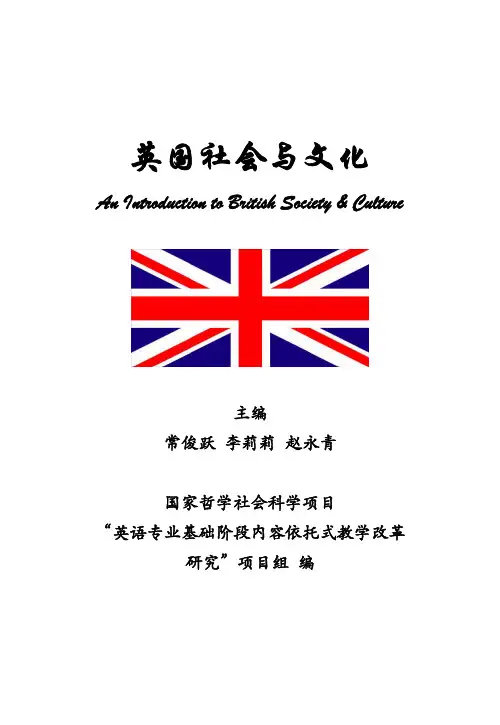
英国社会与文化 An Introduction to British Society & Culture主编常俊跃 李莉莉 赵永青国家哲学社会科学项目“英语专业基础阶段内容依托式教学改革研究”项目组 编ContentsUnit 1 The English Character (1)Text A The English Character (I) (1)Text B The English Character (II) (7)Text C The English Spirit of Control (11)Unit 2 The Constitutional Monarchy (14)Text A The Constitutional Monarchy (15)Text B The Role of the Monarchy Today (23)Text C The Queen’ s Official Birthday (25)Text D Diana, the People’s Princess (27)Unit 3 The British Parliament (33)Text A The British Government Today (34)Text B Political Parties in the U.K (39)Text C Margaret Thatcher (41)Unit 4 Food and Drinks in the U.K (45)Text A Food and Drinks in the U.K (46)Text B British Meals (51)Text C Pub Etiquette (53)Text D Leisure Time for Britons (56)Unit 5 The British Ways & Manners (60)Text A Politeness in Britain (61)Text B What’s Typically British (66)Text C Social Customs in Britain (68)Text D Name Roots (71)Unit 6 Education System in the U.K (74)Text A Going to School: British Style (75)Text B Schools in the U.K (79)Text C Boarding School (81)Unit 7 The British Welfare System (85)Text A Welfare System in the U.K (86)Text B The Welfare State (90)Text C The National Health Service (92)Unit 8 The British Media (94)Text A The British Press (95)Text B The Broadcast Media (100)Text C Local Newspapers in Britain (102)Text B Jury System in the Dock (113)Text C The Police in Britain (115)Unit 10 Family Life in the U.K (118)Text A Family Life in the U.K (119)Text B Changing Values & Norms of the U.K. Family (124)Text D Marriage Customs (127)Unit 11 The British Sports & Games (129)Text A The British Sports (130)Text B Cricket—A Very English Game (136)Text C The Highland Games (137)Text D Traditional Games in Scotland (139)Unit 12 Theatre & Music in the U.K (142)Text A Theatre & Music in the U.K (143)Text B Pantomimes (150)Text C Cats, the Classic Musical (151)Text D The Beatles (152)Unit 13 The British Holidays& Festivals (156)Text A Holidays and Festivals in the U.K (157)Text B Holiday Life in England (164)Text C Valentine Customs (166)Unit 14 The British Literature (I) (168)Text A Overview of British Literature (I) (169)Text B William Shakespeare (176)Text C To be, or not to be (177)Text D Of Studies (179)Unit 15 The British Literature (II) (182)Text A Overview of British Literature (II) (183)Text B Pride and Prejudice (191)Text C Christmas Dinner (193)Text D Agatha Christie––Queen of Crime (196)Appendix: Key to the Exercises (200)重点参考的书目和网站 (214)Unit 1The English CharacterSuccess is the ability to go from one failure toanother with no loss of enthusiasm.——Winston ChurchillUnit Goalsz To understand character and personality of English people e To understand character and personality of English peopl z To get acquainted with some basic cultural concepts concerning English characterTo get acquainted with some basic cultural concepts concerning English character z To learn some useful words and expressions on English character To learn some useful words and expressions on English characterBefore You ReadWork with your partner and share ideas with each other.1) What are the first three things that come into your mind when you hear the words “Britain” or “Britons”?E.g. When I think of “the English” I think of…____________________________________________________________________________________________________________________________________________2) What do you think of the Britons?What are the three descriptivewords you associate the most withthe British people?E.g. _____, _____, _____Start to ReadText A The English Character (I)1. To other Europeans, the best known quality of the British, and inhe never tells you anything about himself, and you may work with him for years without even knowing where he lives, how many children he has, and what his interests are. English people tend to be like that.2. If they are making a journey by bus they will do their best to findan empty seat; if by train, anempty compartment. If theyhave to share the compartmentwith a stranger, they may travelmany miles without starting aconversation. If a conversationdoes start, personal questions like“How old are you?” or even“What is your name?” are noteasily asked.3. This reluctance to communicate with others is an unfortunate quality in some ways since it tends to give the impression of coldness, and it is true that the English (except perhaps in the North) are not noted for their generosity and hospitality. On the other hand, they are perfectly human behind their barrier of reserve, and may be quite pleased when a friendly stranger or foreigner succeeds for a time in breaking the barrier down. We may also mention at this point that the people of the North and West, especially the Welsh, are much less reserved than those of the South and East.4. Closely related to English reserve is English modesty. Within their hearts, the English are perhaps no less conceited than anybody else, but in their relations with others they value at least a show of modesty. Self-praise is felt to be impolite. If a person is, let us say, very good at tennis and someone asks him if he is a good player, he will seldom reply “Yes,” because people will think him conceited. He will probably give an answer like, “I’m not bad,” or “I think I’m very good,” or “Well, I’m very keen on tennis.” Even if he had managed to reach the finals in last year’s local championships, he would say it in such a way as to suggest that it was only due to a piece of good luck.faults, one’s own failure, even atone’s own ideals. The criticism ,“He has no sense of humor” isvery commonly heard in Britain,where humor is highly prized. Asense of humor is an attitude tolife rather than the mere abilityto laugh at jokes. This attitude isnever cruel or disrespectful ormalicious . The English do not laugh at a cripple or a madman, or a tragedy or an honorable failure.6. Since reserve, a show of modesty and a sense of humor are part of his own nature, the typical Englishman tends to expect them in others. He secretly looks down on more excitable nations, and likes to think of himself as more reliable than they. He doesn’t trust big promises and open shows of feelings, especially if they are expressed in flowery language. He doesn’t trust self-praise of any kind. This applies not only to what other people may tell him about themselves orally, but to the letters they may write to him. To those who are fond of flowery expressions, the Englishman may appear uncomfortably cold.7. Finally, sportsmanship . Like a sense of humor, this is an Englishin ideal which not all Englishmen live upto. It must be realized that sport in thismodern form is almost entirely aBritish invention. Boxing, rugby,football, hockey, tennis and cricketwere all first organized and given rulesin Britain. Rules are the essence ofsport, and sportsmanship is the abilityto practice a sport according to its rules,while also showing generosity to one’sdefeat. The high pressure of modern international sport makes these ideals difficult to keep, but they are atleast highly valued in Britain and are certainly achieved there more commonly than among more excitable peoples. Moreover, sportsmanship as an ideal is applied to life in general this is proved by opponent and good temperwell-aimed, strong criticism and “below the belt” is used to describe an unfair one. One of the most elementary rules of life is “never hit a man when he’s down”—in other words, never take advantage of a person’s misfortune. English schoolboys often show this sense of sportsmanship to a surprisingly high degree in their relations with each other.After You ReadKnowledge Focuspartner and share ideas with each other.1. Work with your W h a t w o u l d a n E n g l i s h m a n o r w o m a n u s u a l l y d o i n t h e f o l l o w i n g s i t u a t i o n s ?lishman makes a journey to somewhere by train… man’s skills inomething quite funny happening in public and annis match…rite T if the statement is true and F if it is false.emotional, and____ 2) t noted for their generosity and____ 3) are much less reserved than people of the____ 4) is an attitude to life rather than the mere____ 5) lder” and “below the belt” areAn Eng An acquaintance asks an English lady’s age…Someone pays compliments to an English tennis…There’s s Englishman happens to see it…An Englishman has just lost a ten2. W ____ 1) A reserved person is one who is quite tends gets excited easily.The British people are no hospitality.The Welsh,South and East.A sense of humor ability to laugh at jokes.“Straight from the shou sporting terms borrowed from rugby.Language Focusnings of the bold-faced words in this text and 1. Discuss the mea work with a partner to fill in the blanks with a proper word ormunicate with others, he usuallye guests are treated _______.as honeyis likely to. Fill in the blanks with the following expressions you have be noted for look down on be keen on2) If a person is reluctant to com __________ to start a conversation.3) The hostess is very hospitable , and th 4) Whenever anyone mentions the word “conceit ”, the image of Mr.Darcy comes into mind, he was thought to be_________.5) You’d better ____________those people who are sweet to your face and as malicious as hell behind your back.6) If you seek help from a friend known for generosity , he __________.2learned in this text.due to for a time live up totake advantage of apply to) This rule cannot be ________ any case.to speak English.ilty, but before longlong. I ________ outdooress is entirely ________ his hard work.nts.. Fill in the blanks with the proper forms of words in the1) (reserve) person is one who does not talk very much tosh (except perhaps in the North) are not 12) Students must ________ every opportunity 3) Conceited people always ________ others.4) _________ the police thought she might be gu they eliminated her from their list of suspects.5) This resort ________ its hot springs.6) It’s boring to stay at home all day sports.7) His succ 8) I hope I can ________ the expectations of my pare3brackets.A _____ strangers, does not show much emotion, and seldom gets excited.2) This _____ (reluctant) to communicate with others is an unfortunate quality in some ways since it tends to give the impression of coldness.3) It is true that the Englivery _____ hoolboys often show this sense of sportsmanship to a6)The _____ (criticize), “He has no sense of humor” is commonly heard in Britain, where humor is highly prized. 7)The typical Englishman secretly looks down on more (excite) nations, and likes to think of himself as more _____ (rely) than they. 8) English sc _____ (surprise) high degree in their relations with each other.Comprehensive WorkBritish sayings and try to use them to make 1) time saves nine.an’s poison.not make it drink.em.th.. Pair-work: work with your partner and share ideas with each re the English character with the American character. What 1. Study the following dialogues.A stitch in 2) One man’s meat is another m 3) You can lead a horse to water, but you can 4) The grass is always greener on the other side.5) Don’t cross your bridges before you come to th 6) The best advice is found on the pillow.7) Birds of a feather flock together.8) Don’t look a gift horse in the mou2other.Compa are the similarities and differences?Read Moregolden ”, “Empty vessels make the most noise ” andeirtuations isnot exclusively a sporting one. It describes the sort ofay appear fearless and calm on the surface, deepmanner.2) “Silence is “You are not put on to this earth to enjoy yourself ”. From the sayings above we can get the clue that the English parents want their children to be __________________________________.3) If there is one trait that absolutely singles out the English it is th shared dislike for anyone or anything that “________”.4) To the English the proper way to behave in almost all si to display a languid _____ to almost everything. Even in affairs of the heart, it is considered unseemly to show one’s feelings except ________.5) The term is behaviour both on and off the playing field that characterises everything the English really respect. The term refers to “________”.6) Whilst they m down the English suffer from agonising self-doubt, feeling that in many areas of human activity they just cannot cut the mustard. The underlined expression means __________.7) The English have a strong sense of history and they tend to fillul and inventive, but rarelyText B The English Character (II)S t i f f U p p e rL i p their homes with ______.8) The English are endlessly resourcef ________ their inventions.teristic English pose involveskeep The charac ing the head held high, the upper lip stiffand the best foot forward. In this position,conversation is difficult and intimacy of any kindalmost impossible. This in itself is a clue to theEnglish character.ting rather like the thre nd behaviour against all c od is also Eng in this certainty to the gen vessels make the most noise” and, most telling, “You are not put on to this earth to enjoy yourself”.Small wonder that they end up, as adults, ac e wise monkeys and emotionally in traction.But still the English defend their character a omers. Perhaps that is because Puritanism with its punishing work ethic assures them that their reward for all that restraint will come at a sort of school prize-giving ceremony in the world to come.If it is the latter, they are forgetting that since G lish—a firmly-held belief—any hedonism in the next world will probably be accompanied by mugs of bromide.Nevertheless, the English continue to bask eral astonishment of the rest of mankind.is one trait that absolutely singles out the English it is their shar an excess of emo English the proper way to behave in almost all situations is to d If there ed dislike for anyone or anything that “goes too far”.Going too far, as the English see it, covers displaying tion, getting drunk, discussing money in public or cracking off-colour jokes and then laughing at them noisily. Beyond the pale altogether is the man or woman who regales one with his or her titles or qualifications. The only acceptable place to air these is on an envelope.To the isplay a languid indifference to almost everything, though one may be seething underneath. Even in affairs of the heart, it is considered unseemly to show one’s feelings except behind closed doors.h man or woman refers to you as “a good sport”, you wil sively a sporting one. It describes the sort of beh If an Englis l know that you have really arrived. For to them it is a qualification normally never awarded to a foreigner and by no means within the grasp of all the English.The term is not exclu aviour both on and off the playing field that characterises everything the English really respect. In all physical trials, the goodIt goes without saying that the good sport will also be a good loser. The English are fiercely com S e l re will be no arguing with umpires or outward signs of disappointment. On the contrary, a remark such as “The best man won!” tossed airily to all and sundry, and never through clenched teeth, is obligatory even in the face of crushing defeat.This does not really fool anyone, for the petitive especially in matters sporting. They would rather be crossed in love than beaten on the tennis courts, but to let it be seen would be going too far.f -D o u b tapparent colossal self-confidence and moral certainty of the conquered and foreigners to be e helter-skelter slide from Empire to Commonwealth and S e n It is the English that is paradoxically one of their greatest stumbling blocks. For both qualities are, to a certain extent, only illusions. Whilst they may appear fearless and calm on the surface, deep down the English suffer from agonising self-doubt, feeling that in many areas of human activity they just cannot cut the mustard.All the time there were countries to be governed, the English could sublimate all their clamouring uncertainty. The scent of success served as incense at the altar of their self-assurance.But with th ever downwards, their doubts, like itches, have begun to plague them and it is considered bad form to scratch in public.t i m e n tglish have a strong sense of history. Because their past was so led with old thingsnot The En infinitely more glamorous than their present, they cling to it tenaciously. Mix this love of bygone ages with an unrivalled sentimentality and you have a heady mixture which can be sensed inevery aspect of the English life.Antique shops clutter upevery town and village. Englishhomes are fil only because please the eyebut because there is a feeling thatShi andfather/grandmother, it’s good eno niness is vulgar and the patina of age lends respectability. Thus they cling on to old furniture, old carpets, old chipped china, old kitchen gadgets and garden implements long after common sense dictates that they should be replaced.“If it was good enough for my gr ugh for me!”. The English cry goes up and each new invasion from the future is greeted with the indignant question: “What was wrong with the old one?”. And as far as the English are concerned, there is no answer to that.InventivenessThe English are endlessly resourceful and inventive, but rarely pro one unobserved by gh, he will come up with something with real pro 2. Read the following passage and finish the following exercises.sunny in English comedy shows,to tea drinking in England: The water musttrol is shown infit from their inventions. The inventor in his garden shed turning out gadgets and widgets tends to be almost exclusively male, lacking the more practical female genes in any great numbers.Often perceiving needs in daily life which have g the rest of his compatriots, he will beaver away 24 hours a day creating such indispensable items as the perfect egg boiler or the self-creasing trouser.Occasionally, thou mise like the hovercraft which will then be ignored by his countrymen and taken up by foreigners.1) The English national character is dualistic: One aspect i conservative, the other _____.2) Most Americans find nothing f since English humor is _____ oriented while American humor is more _____ oriented.3) There is a whole ritual be _____ rapidly, the teapot _____, the tea _____, then _____ at least 5 minutes in a teapot covered by a tea cosy.4) In the following passage, the English spirit of con the following aspects: English pubs, ______, pace of living and ______.The English national character is dualistic: One aspect is conservative, the other extroverted. The English people, like people of elsewhere, love to entertain themselves in some pleasure; however, their pleasure always know temperance.The pub is a fine example of the conservative aspect of English character. The pub, unlike the bar in the U.S., is a focal point for the “locals.” One goes to the pub for the same reasons one used to go to church: for fellowship and spiritual enlightenment. There is nothing flashy or plastic about most pubs. Many look like one’s living room, full of plush, soft chairs, couches, a fireplace, and bright lights. The pubs keep respectable hours, too—open from 10 A.M. to 2 P.M. and 5 P.M. to 10 P.M.; Friday and Saturday nights they stay open until 11 P.M. There are no all-night or 3 A.M. public bars. When the pubs close everyone goes home. The pub represents pleasure with control and in good taste.This control is also exemplified in English humor. Most Americans find nothing funny in English comedy shows, since English humor is word oriented while American humor is more action oriented.The same control that is found in English pubs and humor is also found in the English pace of living. Where else does one stand in line quietly for the bus or the taxi?barbarians drink tea by placinga tea bag in a cup of hot water.There is a whole ritual to teadrinking in England: The watermust be boiling rapidly, theteapot warm, the tea loose, thensteeped at least 5 minutes in ateapot covered by a tea cosy.Then and only then does onepour the tea into a cup and drink it. Not only old ladies in lace with Pekingese on their laps drink tea, but a whole nation of workers, entrepreneurs, and aristocrats have tea for breakfast, lunch, and, of course, all activity stops in the afternoon for thecustomary tea break.NotesWinston Churchill (1874–1965) was a Britishpolitician known chiefly for his leadership of theUnited Kingdom during World War II. He served asPrime Minister of the United Kingdom from 1940 to from 1951 to 1955. A noted 1945 and again statesman and orator, Churchill was also an officer in the British Army, a historian, a Nobel Prize-winning writer, and an artist.For FunBooks to ReadJules Verne, Around the World in Eighty Days —Phileas Fogg bets half his fortune against other members of the Reform Club he can travel around the world in 80 days or less.Peter Mandler, The English National Character —a historian of modern Britain challenges long-held familiar stereotypes and proposes an entirely new perspective on what it means to think of oneself as being English.Movies to SeeMr. Bean—Life is a difficultchallenge for Mr. Bean, whohas trouble completing even thesimplest of tasks. Thankfully, his perseverance is usually rewarded, and he finds an ingenious way around the problem.。

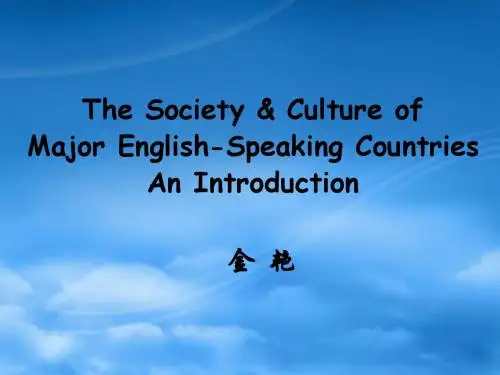
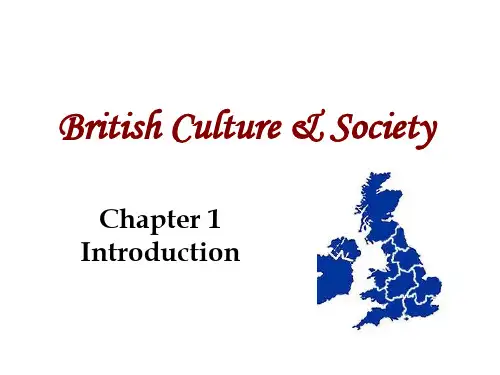

英语国家社会与文化课件英国课件对于英国社会和文化的介绍,我们可以从以下几个方面进行展开:1. 地理位置英国位于欧洲大陆西北部,海岸线长约12,429公里,主要由四个国家组成:英格兰、苏格兰、威尔士和北爱尔兰。
英国拥有丰富的自然资源和文化遗产,如大本钟、伦敦塔桥、巨石阵等。
2. 政治体制英国是一个君主立宪制国家,女王是国家元首,但实权属于议会。
议会分为上议院和下议院,其中上议院由贵族组成,下议院由选举产生。
英国政治体制稳定,政府机构完备。
3. 民族文化英国是多元文化的国家,有英格兰、苏格兰、威尔士和北爱尔兰四个主要民族。
不同的民族有着不同的语言、文化和传统习俗,如苏格兰人的高地舞、爱尔兰的圣帕特里克节等。
同时,英国也是著名的文化名国,有世界著名的莎士比亚、狄更斯等文学大师,以及古堡、博物馆和美术馆等丰富的文化资源。
4. 社会制度英国社会制度较为稳定,有完备的社会保障制度和医疗保健体系。
英国的教育制度也很完善,有优秀的大学和高等教育机构,如牛津大学、剑桥大学等。
5. 风俗习惯英国人对礼仪和规矩比较重视,在社交之中要注意面对对方微笑,并且敬酒等表达敬意的形式也十分重要。
在用餐时不吹食物、不说话,也要注意使用适当的餐具和方式。
英国的饮食文化也十分丰富,如英式早餐、茶文化等。
6. 体育文化英国人热爱体育,切尔西和曼联是足球俱乐部中较为著名的两支。
此外,英国还有板球、橄榄球、拳击等传统运动项目,在奥运会中也有不俗表现。
7. 经济发展英国是世界上最发达的经济体之一,金融、服务业和制造业是其主要产业。
伦敦是欧洲最重要的金融中心之一,也是世界上最多公司总部的城市之一。
总之,英国是一个历史悠久、文化繁荣、发达稳定的国家,其奇特的文化和历史令人向往。
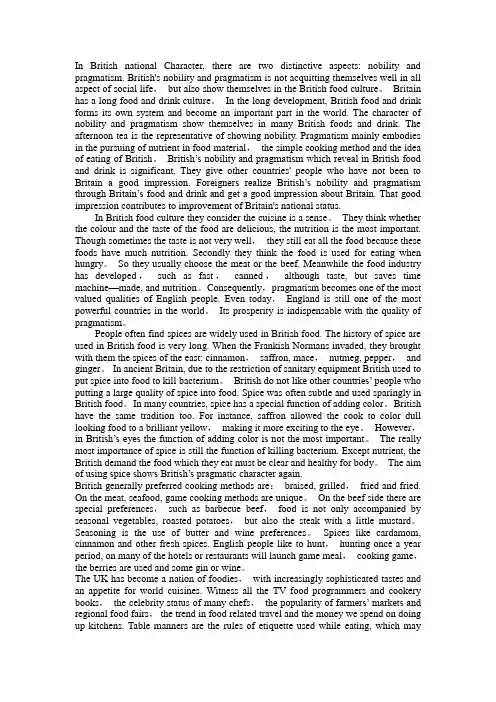
In British national Character, there are two distinctive aspects: nobility and pragmatism. British's nobility and pragmatism is not acquitting themselves well in all aspect of social life,but also show themselves in the British food culture。
Britain has a long food and drink culture。
In the long development, British food and drink forms its own system and become an important part in the world. The character of nobility and pragmatism show themselves in many British foods and drink. The afternoon tea is the representative of showing nobility. Pragmatism mainly embodies in the pursuing of nutrient in food material,the simple cooking method and the idea of eating of British。
British’s nobility and pragmatism which reveal in British food and drink is significant. They give other countries' people who have not been to Britain a good impression. Foreigners realize British’s nobility and pragmatism through Britain’s food and drink and get a good impression about Britain. That good impression contributes to improvement of Britain's national status.In British food culture they consider the cuisine is a sense。
